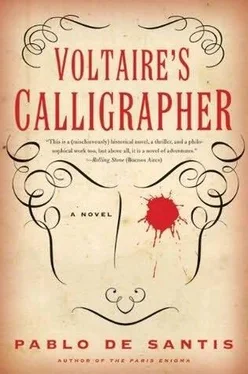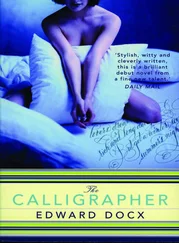1 ...8 9 10 12 13 14 ...26 A young man came out to meet me; he was wearing an ink-stained shirt marked with backwards letters so distinguishable it was as if the garment had been used for blotting paper. He skimmed the letter quickly.
“I’m Aristide Siccard, son of Jean Siccard. It was my idea to take the family business in a new direction. You couldn’t have come at a better time: one of our calligraphers is sick and another is an hour late. Our messenger can’t wait much longer.”
He led me into a small office where a woman was resting on a divan, barely covered by a blanket. She woke up, looked at me, and asked whether I minded if she slept while I worked, assuring me she could doze on her feet. Hers was the absentminded beauty of someone who has never really looked in a mirror. I was at a complete loss for words, for she had let the blanket fall and I had never seen a naked woman. My only experience came from a certain book of engravings called Aphrodite’s Garland that had passed from hand to hand through the dormitories at Vidors’ School.
Siccard brought me the inks they used (thicker than normal ink to prevent them from running on skin). Aristide began reading the text of the message aloud while I concentrated on holding my hand still. A calligrapher’s life is destined to be routine; whenever anything exceptional occurs, his hand begins to shake and all skill evaporates. Unlike every other artist, who leaves a mark and is remembered, this long, laborious wait and inability to rise to the occasion means we as calligraphers fade away and are ultimately forgotten by history.
As per Siccard’s instructions, I began with her upper back. The woman’s name was Mathilde, and that was the first thing I tried to forget. She had pulled up her hair-as black as a pool of ink-but it kept spilling down, threatening to smudge the letters. I tried to think about something else, attempted to concentrate on the message, but the rigidity of those words-administrative councils, investments in Dutch notes-was so contrary to the act of writing that it seemed to pervert the technical terms. I tried to let the light that bathed Mathilde’s body erase all thoughts. I would look at her as if she were an object, nothing more than a surface, and be somewhat successful as I wrote a t , but the curve of a capital R would start my hand trembling again.
I refused to give up and tried to recall the anatomy book that had so disturbed me when I was a student. I wanted to picture the repulsive layers of muscle and bone, but beauty triumphed over my every strategy.
I could hear the worry in Aristide’s voice and made one final attempt to improve my nearly illegible penmanship: I imagined my hand belonged to Silas Darel and was therefore immune to distraction. This thought allowed me to cover areas of a woman’s body I was seeing for the first time. It didn’t feel as though my hand was writing the message; it was more as if the words were patiently pushing my hand from letter to letter. My calligraphy looked like someone else’s, until I came to the signature, forging an unknown name that finally reflected an energy and a caution I recognized as my own.
I might not have been as inept as I remember because before she asked me to leave her to dress in peace, Mathilde looked approvingly in a full-length mirror and said:
“I never feel naked when I’m covered in writing.”
By the time I finished, my nerves were so frayed that I wandered aimlessly until I was lost on the outskirts of the city. Just when I was about to head back, I saw black smoke spiraling up from somewhere nearby. I thought a building must be on fire, but it was a court-ordered burning: books and papers were ablaze as the crowd stared intently at the smoke, as if they could read something in those swirls and lines that I was unable to see. Posted on the wall, a judicial proclamation listed the works that were being burned: it included a satire attributed to Voltaire in which he ridiculed a recent decree. The paper said nothing about the executioner who had set the pile on fire, but a sketch of a mechanical hand concluded the edict.
The watchmakers of Paris were notoriously hard to find. They never set up in a given street but traveled around the city as if it were the face of an enormous clock and they were the obedient hands. Surrounding them was an assemblage marked by time: almanac vendors, fortunetellers, and astronomers who wanted their celestial observations to be added to calendars.
I asked around for Von Knepper, whose name had appeared in the letter from Father Razin. No one knew him, but they were so completely unaware of his existence that the very possibility of him seemed to fill them with fear. I asked one after the other, receiving negatives or silence in reply, until one watchmaker furtively pointed to a woman who was displaying some books on a stone bench.
“Madame Buzot is an expert in the history of machines. She might be able to help you.”
I looked over at the woman wearing a black cloak that revealed only her hands and face, mapped with old scars. I asked the watchmaker about them: their precision betrayed a method, not simply chance or bad luck.
“Madame Buzot was the only female watchmaker in Europe. She was to replace old Van Hals, who was responsible for all the clock towers in Strasbourg. On December 31, 1750, he activated a device to stop the hour hand at precisely twelve o’clock. When Madame Buzot came to repair it, Van Hals was hiding and pulled her inside the clock, intending to kill her. She survived because the mechanism jammed. All of the clocks in Strasbourg came to a halt while she was trapped, and only when she was rescued did time start up again.”
I approached this Mme. Buzot. The books open on the bench showed detailed diagrams of cogs, springs, and gears. It was hard not to stare at her scars, but I greeted her, commented on her merchandise, and finally mentioned Von Knepper.
“You won’t find his name in any book,” she said.
“It’s not a book I’m looking for. I want to find Von Knepper.”
“If you knew what you were saying, you wouldn’t say it out loud. The makers of automatons have fallen from favor; rumor has it they never existed.”
She began to whisper in my ear. Her many years around clocks had given her words a regular beat, as if each syllable corresponded exactly to a fraction of time.
“Von Knepper was a disciple of Jacobo Fabres and worked with him until his death. Fabres taught him to build geese and flautists, but Von Knepper wanted to make the most difficult piece of all: a scribe. No one knows if he succeeded.”
“Where can I find him?”
“I’ve heard of an artisan in a dark street, not far from here, who can restore a clock figurine’s precise movements. If you buy something, I might tell you the name of that street.”
I asked the prices, but they were all too high-particularly when I had no interest in the topic. Mme. Buzot finally pulled a small book with a clock on the cover out of a bag and asked a reasonable price.
Once I had paid, the watchmaker brought her lips to my ear and told me where I might find him. I glanced at the little book as I listened: there was a drawing of a clock on each page, so if you flipped through it quickly, it looked as though the hands were moving.
Everyone around us was gone; the watchmakers had abandoned the place, as if the distant pealing of bells were a summons.
With the little book in my pocket and the street name in mind, I headed to Siccard House, as I did every other afternoon. The more dexterous I became, the more I hoped to postpone the moment when my mercurial position as a spy would force me to leave. My hand no longer trembled, and I had learned to adapt my writing ever so slightly to the pliancy of skin. There were four messengers, and they all liked to converse as they waited for us to finish. Most of all they enjoyed talking about their trips, which sometimes took them far away for weeks at a time. At first I answered in monosyllables, trying to forget the surface under my quill was a woman. Later I intrigued, then amused, and finally bored them with my knowledge of the history of calligraphy. I often think I did some of my best work there, on those words that were inevitably lost between the sheets, with soap and water, or in a sudden rain shower.
Читать дальше
Конец ознакомительного отрывка
Купить книгу












